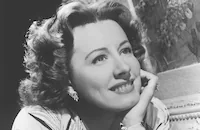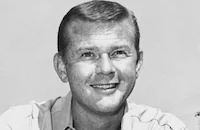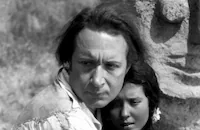Life with Father

Brief Synopsis
Cast & Crew
Michael Curtiz
William Powell
Irene Dunne
Elizabeth Taylor
Edmund Gwenn
Zasu Pitts
Film Details
Technical Specs

Synopsis
In New York City in 1883, businessman Clarence Day strives to run his Madison Avenue home as efficiently as his business. His temperamental outbursts over the smallest infractions so terrorize the servants that even the charm of his sweet-tempered wife Vinnie cannot keep a maid longer than a few days. Vinnie and Clare have four sons, all of whom are redheaded like their parents. The eldest, Clarence, Jr., is headed for Yale. John, the next eldest, likes to invent things, while brother Whitney struggles to learn his catechism, and Harlan, the youngest, is most interested in his dog. Knowing how much Clare dislikes it when visitors stay in the house, Vinnie neglects to tell her husband that their cousin, Cora Cartwright, and her young companion, Mary Skinner, will spend a week with them. Clare is even more put out when he learns that Vinnie has promised that he will take Cora and Mary to Delmonico's restaurant for dinner. As usual, however, Vinnie gets her way. Clare even agrees to take Clarence, who has developed a crush on Mary, to dinner. Later, Mary divulges that she is a Methodist, unlike the Days, who are Episcopalian. During the course of the ensuing religious discussion, it is revealed that Clare has never been baptized. Vinnie is very upset and insists that Clare rectify the oversight to ensure that they will be reunited after death, but Clare refuses, certain that God would never be so imprudent as to deny him entry into heaven. In the meantime, Clarence becomes convinced that wearing Clare's made-over suit forces him to behave like his father. When his stern reaction to Mary's innocent flirtation sends her away in tears, Clarence becomes determined to earn enough money to buy his own suit. He and John get a job selling patent medicine and try it on Vinnie without her knowledge. The medicine makes Vinnie so ill that Clare, believing her to be near death, promises that he will be baptized if she gets well. When Vinnie recovers, however, Clare reneges on his promise. Unknown to Clare, Vinnie then arranges for him to be baptized at a church in Audubon Park so that he will not be embarrassed in front of his acquaintances, but he remains adamantly opposed. Vinnie's opportunity arrives when Clare is repulsed by a ceramic pug dog that she recently purchased and refuses to be baptized as long as it remains in the house. Vinnie quickly dispatches Clarence to return the dog to the store and authorizes him to spend the money on a new suit, which just happens to cost exactly the same amount as the piece of pottery. The next morning, Cora and Mary return for another visit and, wearing his own suit, Clarence makes up with Mary. Taking advantage of the confusion, Vinnie arranges for an expensive cab to drive Clare to Audubon Park. Although Clare protests the expense and denies that he agreed to be baptized if the pug was returned, Vinnie uses her own subtle persuasion to round up the entire family to witness Clare's long-postponed baptism.

Director

Michael Curtiz
Cast

William Powell

Irene Dunne

Elizabeth Taylor

Edmund Gwenn

Zasu Pitts

Jimmy Lydon
Emma Dunn

Moroni Olsen

Elisabeth Risdon
Derek Scott
Johnny Calkins

Martin Milner
Heather Wilde

Monte Blue
Mary Field

Queenie Leonard
Nancy Evans
Clara Blandick
Frank Elliott
Clara Reid
Philo Mccullough
Jock Watt
Claire Meade
Helena Grant
Lois Bridge
George Meader

Douglas Kennedy
Phil Van Zandt
Betty Mcdonough
Geraldine Jarman
Russell Arms
Faith Kruger
Jean Del Val
Jack Martin

Arlene Dahl
Leza Holland
Creighton Hale
Jean Andren
Michael Mineo
Ralph Mineo
Lucille Shamburger
William Ruhl
Gertrude Valerie
David Cavendish
Henry Sylvester
Hallene Hill
Laura Treadwell
Joe Bernard
James Metcalf
John Beck
Elaine Lange
Celia Schreck
Crew
George Amy
Milo Anderson
Fred Applegate
Fred Banker
Della Barnes
C. A. Basseler
Marjorie Best
Robert Buckner
Monroe W. Burbank
Murray Cutter
Herschel Daugherty
Mrs. Clarence Day
Roy Dumont
George Dye
Amelia De Ferris
Frank Flanagan
Leo F. Forbstein
Ray Foster
Stephanie Garland
Gilbert Germaine
Helen Goodman
Robert Haas
James Hopkins
Lee Huntington
Edward Ilou
Natalie Kalmus
Henry Lehman
Rose Lehman
James Leicester
Russ Llewellyn
Rydo Loshak
Hank Mann
Peverell Marley
Jim L. Mathews
William Mcgann
Raymond Moore
Eva Newling
George Nogle
Herbert Plews
Norman Pringle
C. A. Riggs
John Roche
Hildegarde Scott
William V. Skall
Eric Stacey
Max Steiner
Donald Ogden Stewart
Helen Turpin
Robert Vreeland
Cy Warman
Jack L. Warner
Jacqueline Warrington
Perc Westmore
Levi C. Williams
Mina Willowbird
Jack Woods
Warren Yaple

Photo Collections
Videos
Movie Clip




Trailer
Hosted Intro




Film Details
Technical Specs

Award Nominations
Best Actor
Best Art Direction
Best Cinematography
Best Score
Articles
Life with Father - Life With Father
For Life With Father, Warner Bros. had paid the highest price to date for the screen rights to a play ($500,000 plus half of all profits to the authors and their investors). To protect the integrity of the material, playwrights Lindsay and Crouse and Day's widow were brought to Hollywood to serve as technical advisers. They had veto rights over every aspect of the film's production, and no word of the play's text could be cut or changed without their approval. Stewart had diplomatically avoided reworking the dialogue but, whenever possible, moved the action from the stage confines of the Days's dining and parlor room to other parts of the family house, its garden and the street. To the approval of the trio of overseers, he dramatized scenes that were only referred to in the play, setting them in a church, a restaurant and a department store.
Life With Father proved a success on the screen, gathering four Oscar nominations and placing well on Variety's list of all-time high-grossing films. Playing Clarence Day Sr. provided Oscar-nominated William Powell with the high point of his career, and Irene Dunne charmed audiences as his wife, Vinnie. The film also offered a plum supporting part to budding beauty Elizabeth Taylor, then 15.
Stewart (1894-1980) was a man of many talents - screenwriter, playwright, novelist, actor. Playwright Philip Barry, a chum and admirer of the suave Stewart, wrote the role of socialite Nick Potter in Holiday with his friend in mind, and Stewart played the part on Broadway. Stewart's credits as a film writer include The Barretts of Wimpole Street (1934), Marie Antoinette (1938), Love Affair (1939) and the movie version of Barry's The Philadelphia Story (1940), for which Stewart won an Academy Award.
During Hitler's rise to power, Stewart had become involved in the political activities of the Hollywood Anti-Nazi League - an organization accused of being a cover-up for a Communist cell during the McCarthy era. Offered a chance to "clear himself" by giving names to the House Un-American Activities Committee, Stewart refused and was blacklisted. He left Hollywood for good in 1951 and finished out his career in England.
Director: Michael Curtiz
Producer: Robert Buckner
Screenplay: Donald Ogden Stewart, from the memoir by Clarence Day Jr. and the play by Howard Lindsay and Russel Crouse
Art Direction: Robert M. Haas
Cinematography: J. Peverell Marley, William V. Skall
Editing: George Amy
Costume Design: Milo Anderson
Original Music: Max Steiner
Principal Cast: William Powell (Clarence Day), Irene Dunne (Vinnie Day), Elizabeth Taylor (Mary Skinner), Edmund Gwenn (Rev. Dr. Lloyd), Zasu Pitts (Cousin Cora), Jimmy Lydon (Clarence Day Jr.), Emma Dunn (Margaret)
C-118m.
by Roger Fristoe

Life with Father - Life With Father
Quotes
"I'm going to be baptized, damn it!"- Clarence Day
They can't keep me out of heaven on a technicality!- Father
Trivia
Notes
The opening titles card reads "Clarence Day's Life with Father. Although there is a copyright statement on the film, it is not listed in the U.S. Catalog of Copyright Entries for Motion Pictures. Clarence Day, Sr. was a governor on the New York Stock Exchange. His father, Benjamin, founded the New York Sun and his brother, Benjamin, Jr., invented the Ben Day process for color printing. Clarence Day, Jr.'s books were originally published as a series of essays in the New York Evening Post, Harpers and The New Yorker. After Day's death in 1935, the stories became the basis of a play by Howard Lindsay and Russel Crouse. The play's original Broadway run lasted for eight years.
Hollywood Reporter news items add the following information about the production: In 1940, Samuel Goldwyn offered $200,000 for screen rights to the Oscar Serlin production of the play, but the purchase did not take place because Serlin demanded a three-year clearance clause before the exhibition of the film. In July 1944, Mary Pickford negotiated with Serlin for rights, planning to star in the film with William Powell. Warner Bros. acquired the screen rights to the play in November 1944 for a reputed down payment of $500,000 plus a percentage of the net proceeds. As part of the agreement, the film was not to be released before 1947 and the property was to revert back to Oscar Serlin after a period of seven years.
The agreement also stipulated that Warner Bros. could make only one film based on the play, the script could use only that part of Clarence Day's life which was included in the Broadway play, and that the owners were to have editorial rights over matters of good taste in the film version. Both Lindsay Crouse and Mrs. Day were to be technical advisors on the film's production, but only Mrs. Day is credited on the film. Howard Lindsay and Dorothy Stickney, stars of the stage production, tested for the lead roles. Rosalind Russell was considered for the part of "Vinnie Day," and Bette Davis, Rosemary DeCamp and Mary Pickford also tested for the role. Fredric March was considered for the role of "Clarence Day," as was Ronald Colman.
According to information in the file on the film at the USC Cinema-Television Library, Shirley Temple and Ann Todd tested for the role of "Mary;" Freddie Bartholomew tested for "Clarence;" and Cora Witherspoon tested for "Aunt Cora." Director Michael Curtiz disliked ZaSu Pitts's performance as Aunt Cora so much that he attempted to replace her mid-film, but as no acceptable substitute could be found, she continued in the role. William Powell and Elizabeth Taylor were borrowed from M-G-M for the production. Studio production notes included in the file on the film at the AMPAS Library state that with the exception of Martin Milner, a natural redhead, all the actors playing members of the Day family had dyed red hair.
The film's premiere was held at the Lakewood Theater in Skowhagen, MN, where the play had its first tryout on the same day eight years earlier. Modern sources note that half of the released prints billed Dunne first and the other half listed Powell's name first. First run theaters were required to alternate prints and advertising alternated the same way. The film received the following Academy Award nominations: Powell for Best Actor, Robert Haas for Art Direction, George James Hopkins for Set Decoration, Peverell Marley and William V. Skall for Best Color Cinematography, and Max Steiner for Best Musical Score. In a July 31, 1948 Saturday Evening Post article, Powell cited the character of "Clarence Day" as his favorite screen role to date. Clarence Day's stories about his father also served as the basis for a television series starring Leon Ames and Lurene Tuttle, which ran from November 1953 until July 1955.

Miscellaneous Notes
Released in United States Fall September 13, 1947
Released in United States Fall September 13, 1947
Based on the stage play by Howard Lindsay and Russel Crouse, which was based on essays written by Clarence Day, Sr..














